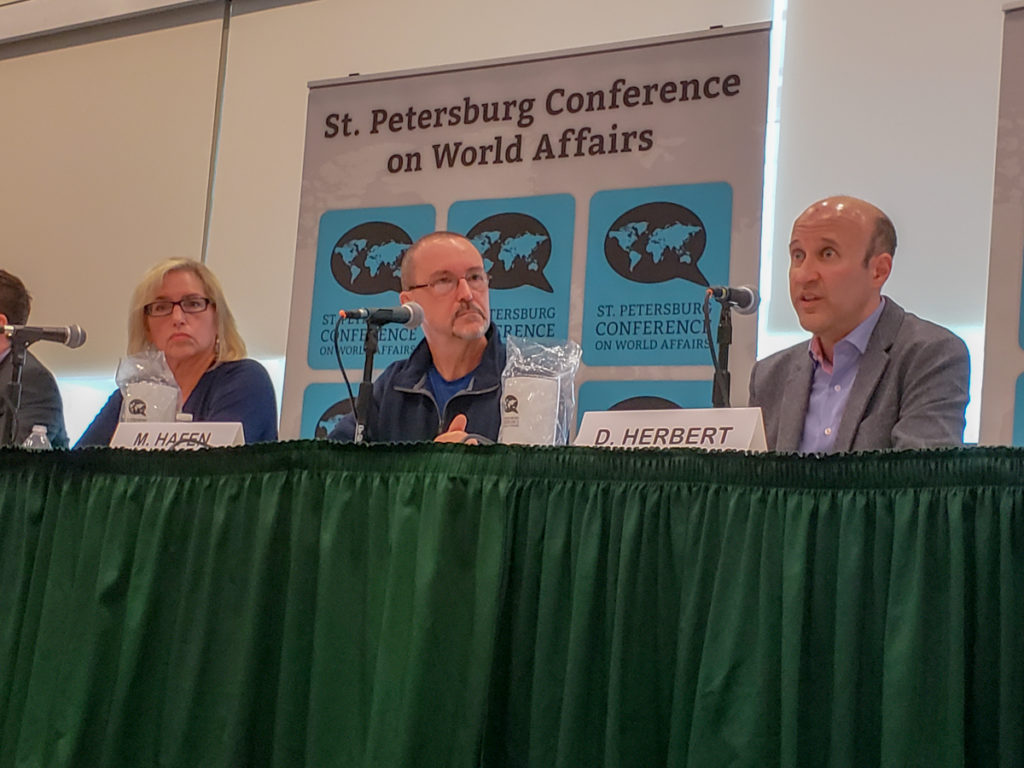
Europe is “falling disastrously behind” the Paris climate agreement, says Herbert (right). Dylan Hart | The Crow’s Nest
By Dylan Hart
Douglas Herbert is not a smoker, but says he inhales the equivalent of 183 cigarettes a year.
“The reason I smoke 183 cigarettes a year is because I live in Paris, where diesel fuel pollutes the air,” Herbert said. “If you visit London for a four-day weekend, it’s almost three cigarettes.”
Herbert, a journalist and foreign affairs commentator for the international news channel France 24, joined professor Don Chambers and marine scientist Ellen Prager at the St. Petersburg Conference on World Affairs for a panel on climate change.
Herbert told the packed ballroom that while he might not know science on the same level as Chambers or Prager, he does know the politics behind climate change, especially in Europe. And he has his own ideas on how to combat climate change.
“There’s a very high awareness of this issue in Europe,” he said. “But there are varying degrees of ambition. All of Europe is seen as right now falling disastrously behind the Paris climate commitment, and it’s not on track to follow that commitment.”
French voters elected President Emmanuel Macron in 2017. Macron, while a centrist, ran as an environmentalist, but he has received some backlash from the public for enacting environmental policies.
Most notably, Macron introduced a gas tax in 2018 that sparked a massive protest of over 280,000 French demonstrators wearing yellow vests.
While optimistic about an environmental solution, Herbert argued that cutting down car usage in France – much less the United States – is unrealistic.
“The reality in France, here, and in any other industrialized country is that people rely on their cars to go to work,” Herbert said. “Macron didn’t take into account that vast swaths of France, especially the most economically disadvantaged parts of France, rely on their cars.”
Herbert also said that France is “in bed with the nuclear industry.”
Over 75 percent of France’s power comes from nuclear energy, and Herbert believes that France won’t close the plants anytime soon, unlike neighboring Germany, which is working on eliminating nuclear by 2022.
“On the surface, if you’ve never heard of Fukushima or Chernobyl or anything else, nuclear is great,” he said. “But (people) in France don’t want to live anywhere near a power plant – they think ‘not in my backyard.’
“The easiest thing for me to say is that I’m against nuclear because of the potential damage, but there are a lot of misunderstandings about nuclear energy.”
Herbert noted that he has visited several nuclear power plants and that the safety of the plants has significantly improved.
“‘Activist Doug’ would really like to say it’s awful and to get rid of it, but my rational self thinks it’s become safer and safer and, utilized the right way, it’s a very good energy – it’s very cheap and efficient.”
Chambers, a professor of physical oceanography at USF, argued that nuclear energy “needs to be a part of the discussion,” contending that only the Chernobyl disaster in Ukraine was “really catastrophic” and that the 1979 Three Mile Island accident in Pennsylvania was blown out of proportion.
He also pointed out that while Germany is phasing out nuclear, it will still rely on French nuclear power and pollutive coal to fuel the country.
But the average person can’t solve transportation issues or pick what kind of energy fuels their country. So what can an individual do to combat climate change?
There are a lot of ways, according to the three panelists. But Herbert brought some often unaddressed ideas to the table: avoid “buying new,” track your carbon footprint and eat locally sourced food.
“Know where your food is produced,” he said. “Be in touch with nature.”
When asked to give 30-second conclusions, the three panelists were unanimous: “Voting in the next election” is the biggest thing an individual can do to fight climate change.



